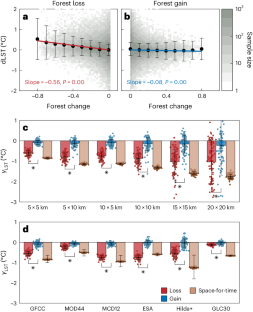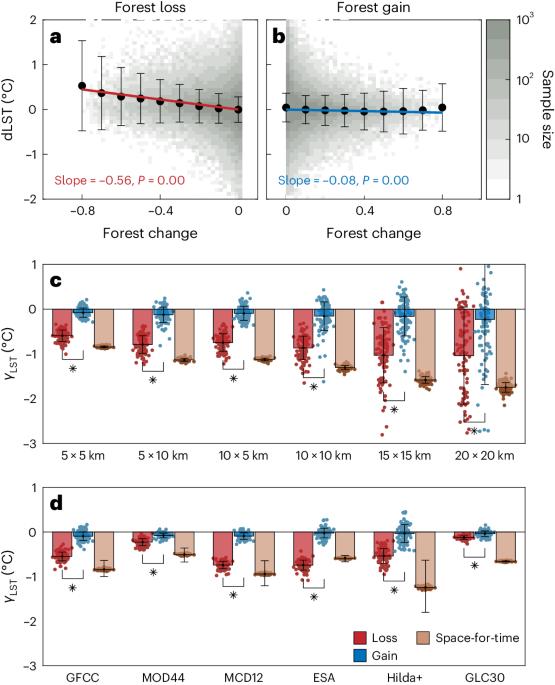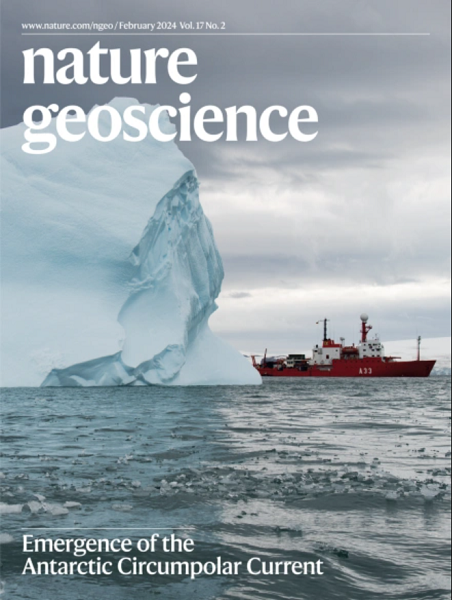森林增减对热带地表温度的不对称影响
IF 16.1
1区 地球科学
Q1 GEOSCIENCES, MULTIDISCIPLINARY
引用次数: 0
摘要
热带地区森林的增加可以通过生物物理过程改变能量预算,从而冷却地表。许多国家已将植树造林作为应对气候变暖战略的一部分。然而,森林增量的生物物理效应通常是基于热带森林持续减少的对称逆转来估算的。在这里,我们利用多种来源的卫星遥感数据来探讨陆地表面温度对森林增减的敏感性,发现森林减少使地表升温 0.56 ± 0.12 °C,森林增加使地表降温 0.10 ± 0.09 °C。这种不对称性表明森林增量对当地温度的生物物理效应较弱,我们将其归因于植被特性(如叶面积和绿度)的对比变化。我们发现,目前的地球系统模型未能捕捉到观测到的不对称现象,因此未来可能会高估植树造林的降温效应。这突出表明,有必要改进森林人口对生物物理相关植被特性(如叶面积指数、反照率和冠层结构)影响的表述,以更好地估计热带植树造林对地表温度的影响。本文章由计算机程序翻译,如有差异,请以英文原文为准。


Asymmetric impacts of forest gain and loss on tropical land surface temperature
Forest gain in the tropics can cool the land surface by altering the energy budget through biophysical processes. Many countries have adopted forestation as part of their strategies for tackling climate warming. However, the biophysical effects of forest gain have generally been estimated based on the symmetrical reversal of ongoing tropical forest loss. Here we use multiple sources of satellite remote sensing data to explore the sensitivities of land surface temperature to forest gain and loss, and find forest loss warming the surface by 0.56 ± 0.12 °C and forest gain cooling the surface by 0.10 ± 0.09 °C. This asymmetry indicates weaker biophysical effects of forest gain on local temperature, which we attribute to contrasting changes of vegetation properties, such as leaf area and greenness. We find that current Earth system models fail to capture the observed asymmetry and thus could overestimate the cooling effect of afforestation in future. This highlights the need to improve representation of forest demographic impacts on biophysics-related vegetation properties, such as leaf area index, albedo and canopy structure, to better estimate the effects of tropical forestation on surface temperature. The impact of forest loss on land surface temperature in the tropics is five times greater than the response to forest gain, according to satellite observations of temperature and land cover.
求助全文
通过发布文献求助,成功后即可免费获取论文全文。
去求助
来源期刊

Nature Geoscience
地学-地球科学综合
CiteScore
26.70
自引率
1.60%
发文量
187
审稿时长
3.3 months
期刊介绍:
Nature Geoscience is a monthly interdisciplinary journal that gathers top-tier research spanning Earth Sciences and related fields.
The journal covers all geoscience disciplines, including fieldwork, modeling, and theoretical studies.
Topics include atmospheric science, biogeochemistry, climate science, geobiology, geochemistry, geoinformatics, remote sensing, geology, geomagnetism, paleomagnetism, geomorphology, geophysics, glaciology, hydrology, limnology, mineralogy, oceanography, paleontology, paleoclimatology, paleoceanography, petrology, planetary science, seismology, space physics, tectonics, and volcanology.
Nature Geoscience upholds its commitment to publishing significant, high-quality Earth Sciences research through fair, rapid, and rigorous peer review, overseen by a team of full-time professional editors.
 求助内容:
求助内容: 应助结果提醒方式:
应助结果提醒方式:


